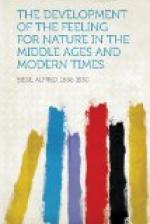By the well-known expression of Greek philosophy, ’like is only understood by like,’ the Pythagoreans meant that the mathematically trained mind is the organ by which the mathematically constructed cosmos is understood. The expression may also serve as an aesthetic aphorism. The charm of the simplest lyrical song depends upon the hearer’s power to put himself in the mood or situation described by the poet, on an interplay between subject and object.
Everything in mental life depends upon this faculty. We observe, ponder, feel, because a kindred vibration in the object sets our own fibres in motion.
‘You resemble the mind which you understand.’
It is a magic bridge from our own mind, making access possible to a work of art, an electric current conveying the artist’s ideas into our souls.
We know how a drama or a song can thrill us when our feeling vibrates with it; and that thrill, Faust tells us, is the best part of man.
If inventive work in whatever art or science gives the purest kind of pleasure, Nature herself seeming to work through the artist, rousing those impulses which come to him as revelations, there is pleasure also in the passive reception of beauty, especially when we are not content to remain passive, but trace out and rethink the artist’s thoughts, remaking his work.
’To invent for oneself is beautiful; but to recognise gladly and treasure up the happy inventions of others is that less thine?’ said Goethe in his Jahreszeiten; and in the Aphorisms, confirming what has just been said: ’We know of no world except in relation to man, we desire no art but that which is the expression of this relation.’ And, further, ’Look into yourselves and you will find everything, and rejoice if outside yourselves, as you may say, lies a Nature which says yea and amen to all that you have found there.’
Certainly Nature only bestows on man in proportion to his own inner wealth. As Rueckert says, ’the charm of a landscape lies in this, that it seems to reflect back that part of one’s inner life, of mind, mood, and feeling, which we have given it.’ And Ebers, ’Lay down your best of heart and mind before eternal Nature; she will repay you a thousandfold, with full hands.’
And Vischer remarks, ’Nature at her greatest is not so great that she can work without man’s mind.’ Every landscape can be beautiful and stimulating if human feeling colours it, and it will be most so to him who brings the richest endowment of heart and mind to bear: Nature only discloses her whole self to a whole man.
But it is under the poet’s wand above all, that, like the marble at Pygmalion’s breast, she grows warm and breathes and answers to his charm; as in that symbolic saga, the listening woods and waters and the creatures followed Orpheus with his lute. Scientific knowledge, optical, acoustical, meteorological, geological, only widens and deepens love for her and increases and refines the sense of her beauty. In short, deep feeling for Nature always proves considerable culture of heart and mind.




